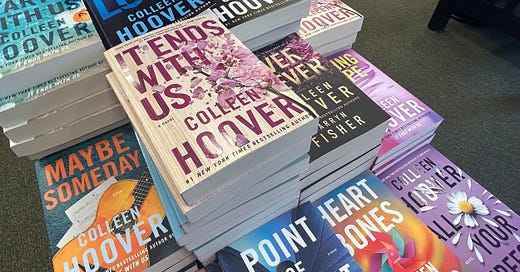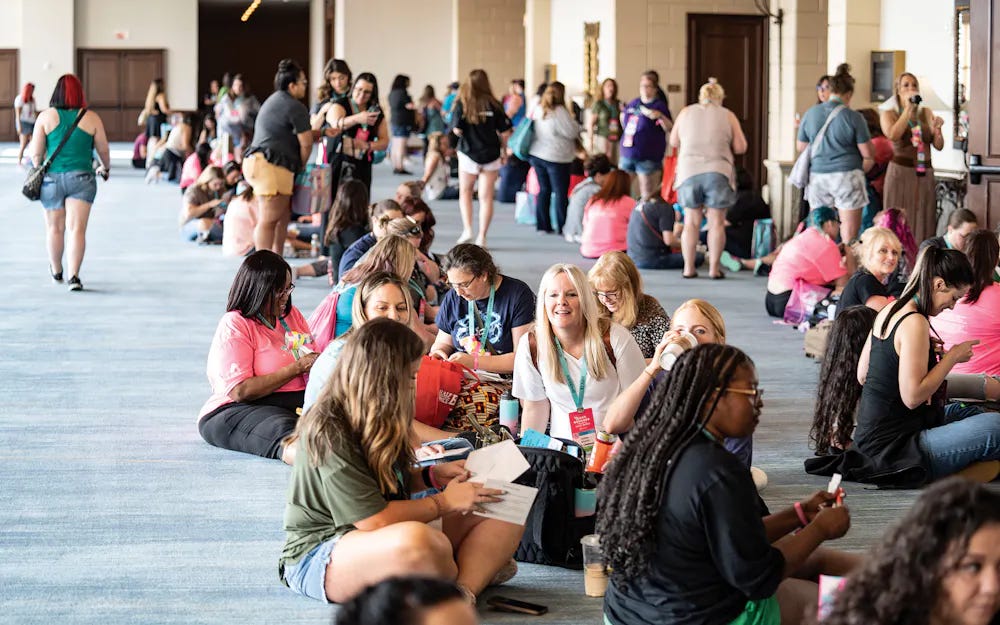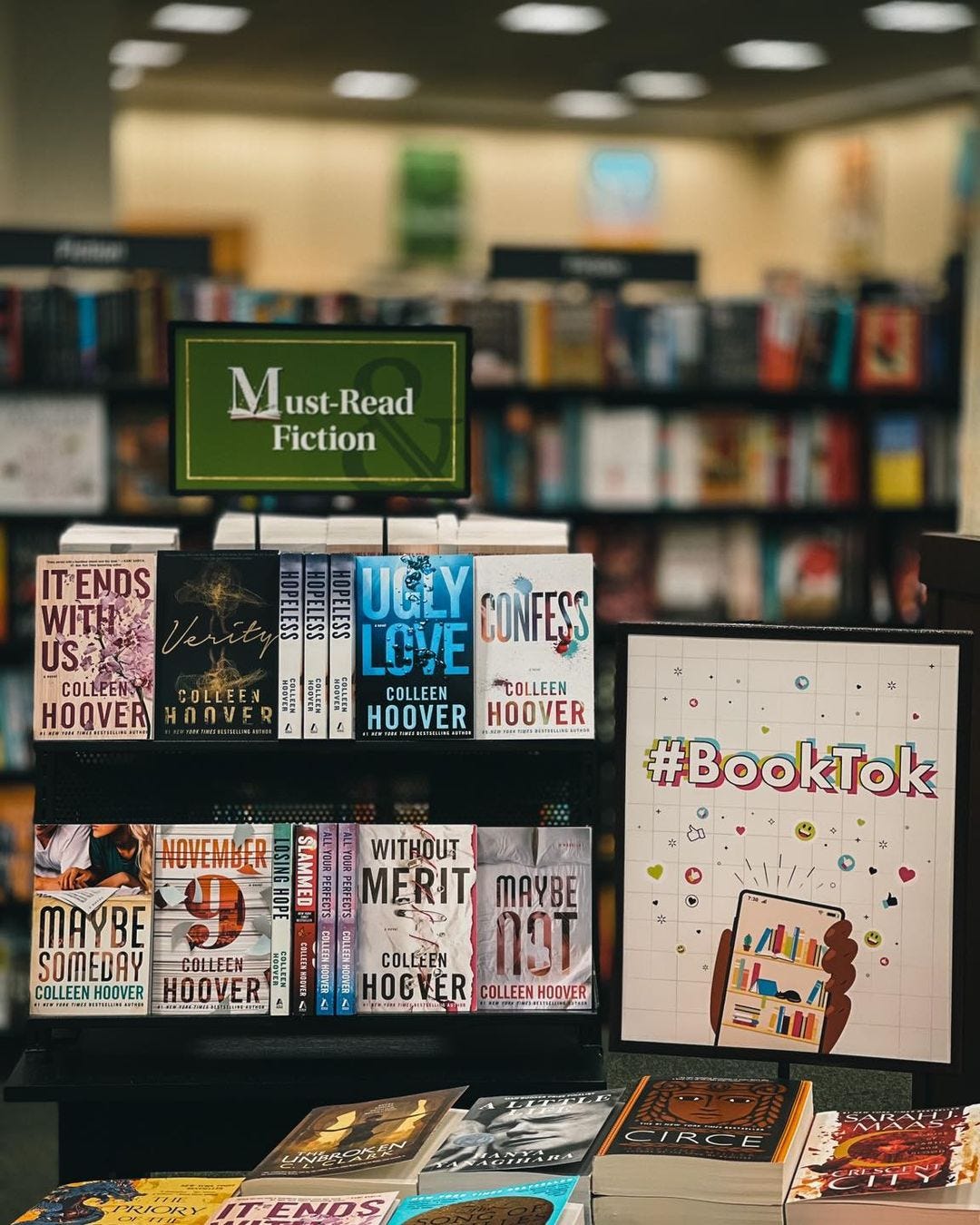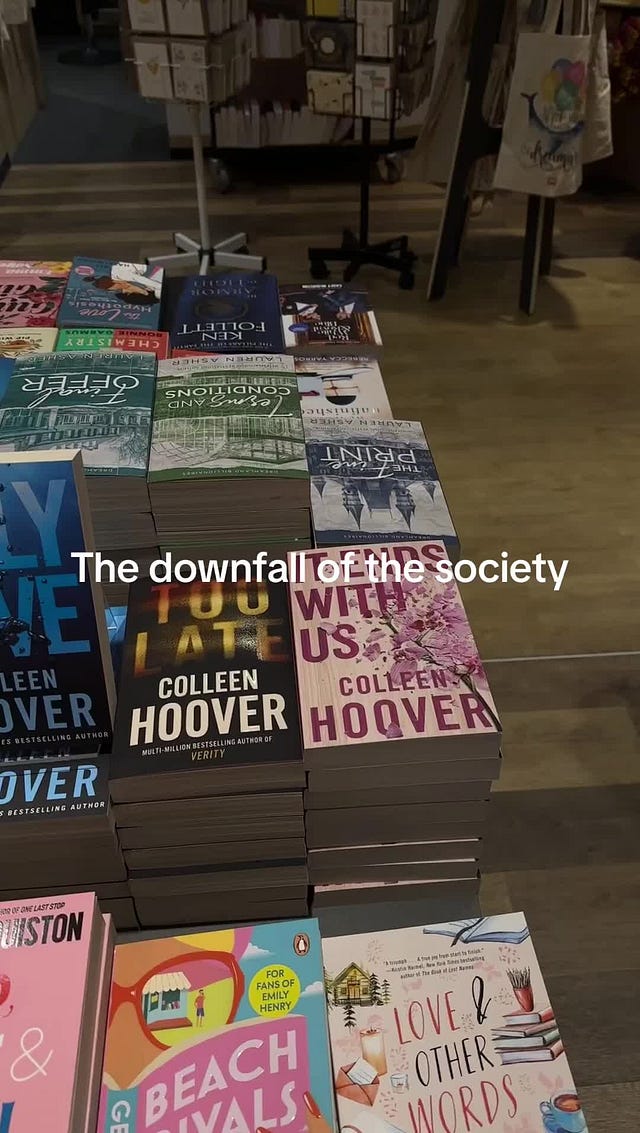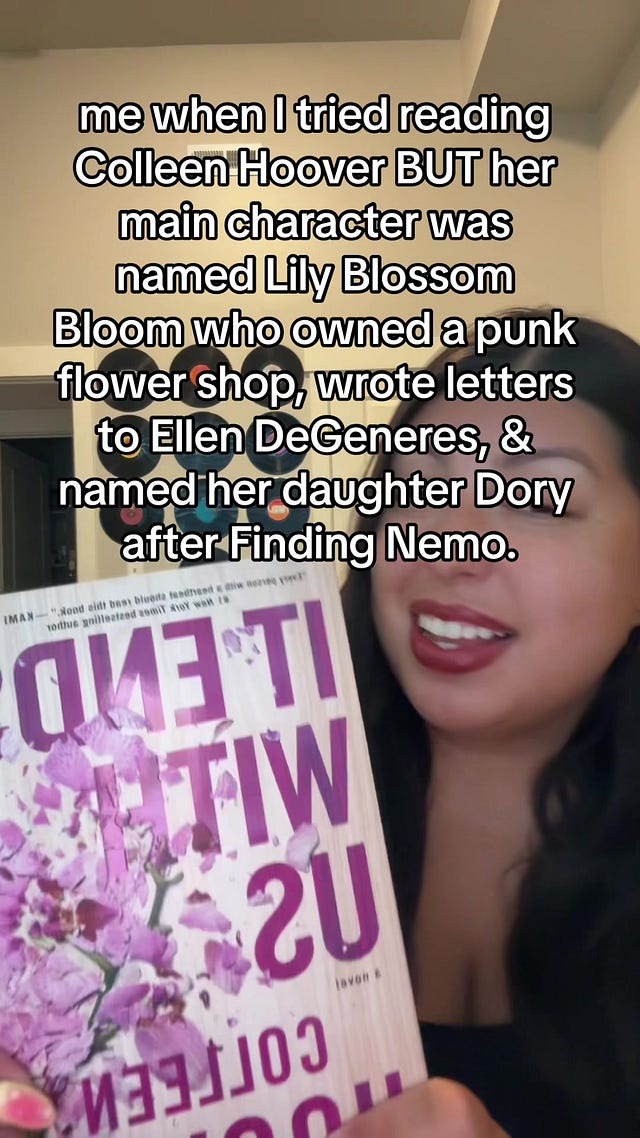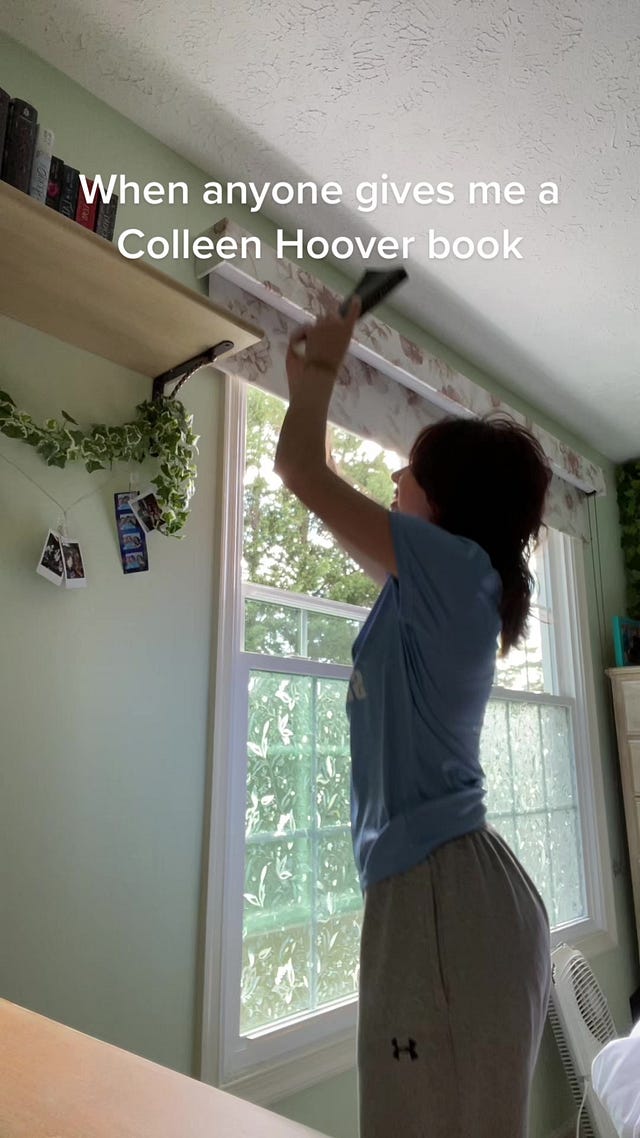Behind the Ascent of 'It Ends with Us,' Summer's Messiest Blockbuster (1)
A summer blockbuster based on Colleen Hoover's best-selling novel proves the impressive appeal of her stories. But how did this Texas author become a global obsession?
“It Ends with Us” has become one of this summer’s biggest success stories, grossing $187 million worldwide in just two weeks on a modest $25 million budget. But it’s not just the box office numbers that have everyone talking. The film has sparked intense discussion on social media due to the unusual behavior of its stars and clear signs of behind-the-scenes drama.
Of course, no one can resist some good Hollywood gossip. But what truly fueled the intense interest in this film is the impact and polarizing nature of the best-selling novel it’s based on. So, before we dive into the juicy drama involving movie stars and their egos, let’s explore the genesis of it all: the rise of Colleen Hoover, an unassuming Texas woman who became the world’s best-selling author.
Humble Beginnings
Living in poverty, a Texas mom self-published her first novel. In less than a year, she was on the New York Times Best-Sellers List.
Colleen Hoover is many things: a 44-year-old mom of three from Texas, a former social worker, and a best-selling author. Above all, she is a multi-million dollar brand. Her name on a book cover is enough to send it soaring to the top of the best-seller list, and she has been the world’s best-selling author for three consecutive years.
Like many other pop culture phenomena, Hoover's ascent presents an engaging rags-to-riches story. Back in 2011, she was a social worker living in poverty in small-town Texas while raising three young boys. Her husband, a long-distance truck driver, spent most of his time on the road. She lived in a trailer, drove a minivan with no AC, and was even eligible for food stamps. Her idea of a splurge was taking her boys to Walmart once a year so they could choose a toy. She was happy living like that, though exhausted, spending 16 hours of her day juggling her full-time job and her boys' after-school activities. To relax, she’d read books or watch random videos on YouTube, and one day, she found herself immersed in hours of slam poetry videos. This experience left her wanting more, so she searched Amazon for a love story on the theme but found none. Determined, she decided to write one herself.
She typed out the first chapter of “SLAMMED,” printed it, and handed it to her mom and a few acquaintances, like her boss. All of them had the same reaction: “OK, where’s the rest?” Although she felt ashamed to admit that’s all she had, their encouragement spurred her to keep writing. After finishing the first novel, she began working on a sequel. Since her grandmother had just gotten a Kindle, she decided to self-publish the books on Amazon. The first novel was released in January 2012, followed by its sequel, “Point of Retreat,” the next month.
A forbidden love story involving slam poetry and family drama, SLAMMED sold 30 copies in its first week, earning her enough money to pay some of her bills. Initially, this success came from friends and family, but as she promoted the book in online book communities, sales began to increase—not a lot, but a reasonable number. The buzz kept building, and when Maryse Black, a seasoned book blogger, gave it a positive review, sales soared. From then on, word of mouth propelled the book to fame on Amazon, and to her shock, it hit the New York Times best-selling list by August. A few weeks later, Atria Books, a Simon & Schuster imprint, acquired the rights to print her hit novels, allowing her to leave her job and become a full-time writer.
A Loyal Following
For seven years, Colleen Hoover enjoyed a stable and successful career. It felt terrific, but it was all very modest compared to what was to come.
Although Hoover continued working with Atria Books, she also chose to self-publish some of her stories—a wise decision given the profit margins. In January 2013, with her name already established thanks to the success of the “SLAMMED” book series, her self-published novel “Hopeless” hit #1 on the New York Times E-book list.
In the following years, Hoover had multiple bestsellers and formed a loyal readership. Prolific in her writing, she produced three books a year, exploring different genres while consistently returning to themes of romance, human drama, and family trauma.
She skillfully wove these topics into what would become her best-selling title, 2016’s “It Ends with Us.” The book, inspired by her mother’s story, dealt with domestic abuse and was published by Atria Books. Given Hoover’s status as a popular author, it received substantial publicity, including a nine-stop national book tour and blurbs from bestselling authors. “It Ends with Us” hit the bestseller list in its first week and sold about 21,000 copies in its first month—a solid achievement by industry standards. However, after its initial buzz, sales flatlined, and the book faded into relative obscurity.
At the time, there was no cause for concern; the book was following a common pattern. By all measures, it was successful, and by 2019, it had surpassed 100,000 copies sold in the US and been translated into more than 20 languages. What seemed extraordinary back then would soon be eclipsed by what was yet to come.
The first sign of the book’s revival came in November 2020, when Atria noticed a bump in sales. By the summer of the following year, the bump had become a surge as hundreds of thousands of readers picked up the book as their vacation read. By the end of 2021, “It Ends with Us” had sold almost 800,000 copies that year alone.
Driving up the frenzy? TikTok’s algorithm.
A TikTok-fueled Phenomenon
Seemingly out of the blue, TikTok would turn Colleen Hoover into the world’s best-selling author.
By early 2021, TikTok had firmly established itself as the world’s most influential social media platform. Its impact was everywhere, driving the virality of hit songs, beauty trends, and, increasingly, books.
Exciting the BookTok community meant an instant best-seller— major bookstores across the US and Europe began dedicating sections to TikTok-fueled titles. The phrase “TikTok Made Me Buy It” became a hallmark of book marketing. Catalog books that had languished in obscurity for years suddenly sold millions of copies, not just in the US but around the globe, after being discovered by the platform users.
No one benefited more from the BookTok phenomenon than Colleen Hoover. Her book “It Ends with Us” went viral in November 2020 as users started posting videos furiously weeping over it. Social media virality quickly transcended borders, making the book the best-selling title in nearly every country in Europe and Latin America.
Young people and female readers—the critical groups behind Colleen Hoover’s success and the rise of BookTok—form a powerful force in publishing. While critics might scoff at popular women-driven literary successes, 20th-century game-changers like Harlequin novels and Danielle Steel have repeatedly demonstrated the power of this demographic. Meanwhile, the enthusiasm of young readers can turn a hit book into a billion-dollar franchise. With such influence, it’s no surprise that these two groups often drive the latest book trends.
Between the late 1990s and mid-2000s, “Bridget Jones’s Diary” became an international bestseller, giving rise to the “chick lit” genre—light, female-targeted novels that dominated the market. Authors like Marian Keyes and Sophie Kinsella (with the “Shopaholic” series) became global sensations. These page-turners often revolved around themes that tend to resonate with women, such as the glamour of fashion and big-city life (“The Devil Wears Prada” by Lauren Weisberger and Candace Bushnell’s novels), family drama (Jodi Picoult), or love stories with bittersweet twists (Jojo Moyes, Cecelia Ahern), all written in an entertaining, romcom-like style. Several of these titles were targeted at teen girls, like “The Princess Diaries” by Meg Cabot, “Confessions of Georgia Nicolson” by Louise Rennison, and “The Sisterhood of the Traveling Pants” by Ann Brashares.
By the mid-2000s, the Young Adult (YA) genre had become a breeding ground for publishing hits, quickly adapting booming trends into sub-genres. A prime example is the “rich high-schoolers” trope, which took teen girls’ bookshelves by storm after the success of the “Gossip Girl” book series, spawning numerous imitators (“The A-List,” “Privates”). The segment expanded to include wealthy middle school drama with the success of “The Clique” series. The YA market was so lucrative that a multi-million-dollar company, Alloy Entertainment, was created solely to package potential best-sellers. Alloy developed “The Clique,” “Gossip Girl,” “The Vampire Diaries,” “Pretty Little Liars,” and “The Sisterhood of the Traveling Pants,” among countless others, which it then turned into hit films and TV shows.
Beyond Alloy, the strength of the YA sector in the 2000s led to historical successes like “Twilight” and “The Hunger Games,” introspective fare like “The Perks of Being a Wallflower,” and tearjerkers like John Green’s “The Fault in Our Stars,” all of which have been adapted successfully to the big screen.
Of course, before that, there was Harry Potter, arguably the world’s most significant publishing phenomenon, which led to a surge in fantasy and adventure books for children and teens.
Genres like YA, “chick lit,” and children’s fantasy were traditionally published by established editorial houses and vetted by professional editors. This resulted in a diverse yet somewhat organized and uniform landscape that fit into bookstores’ pre-determined genres. However, the rise of the Amazon Kindle and its self-publishing features introduced a new reality, leading to the emergence of erotica, already a popular but barely talked about genre, as a dominant force, with E.L. James’ “Fifty Shades of Grey” becoming a worldwide sensation. This marked the beginning of a new era, where genre boundaries blurred, best-sellers targeting women became more explicit, and readers could bypass traditional editorial processes.
Of course, nothing is entirely new. Long before social media, books addressing adult themes and explicit content occasionally topped best-seller lists, often targeting young readers searching for salacious content (the most obvious example being V.C. Andrew’s “Flowers in the Attic” from 1979). Nowadays, traditional romance, YA, thrillers, and other conventional genres remain popular on TikTok and other platforms.
However, publishing standards of the early 2000s kept teen literature largely PG or PG-13. Today, in a genre-blurring, social media-fueled market, series like Hannah Grace’s “Maple Hill” can gain traction among high schoolers with their cutesy covers despite being racy and graphic. Similarly, the hottest fantasy series among young readers, Sarah J. Maas’ “A Court of Thorns and Roses,” is notable for, to put it plainly, a lot of fairy fucking, presenting a stark contrast to the tamer big YA franchises of yore like “The Hunger Games” and “Twilight.”
To accommodate the smutty content in a commercially safe way, Maas’s series was initially classified under a new category, “new adult.” Although several of the most popular contemporary novels, including Colleen Hoover’s, were promoted as part of this genre, it never really took off—perhaps because today’s readers aren’t too concerned with labels. Or, more likely, because “popular on TikTok” is a more compelling category.
The audience driving BookTok is primarily young and female, from early teens to mid-30s. The books propelled by the community can range from erotica to psychological thrillers. They tend to elicit strong feelings: horniness, sadness, fear.
TikTok bypasses traditional genres, book critics, and elaborate marketing campaigns to turn books into best-sellers based solely on virality. Coupled with the rise of self-publishing, even editors, traditionally behind streamlining and polishing narratives, and publishing houses can be left behind.
Still, the entire publishing industry benefits from the BookTok phenomenon. BookTokers' appreciation for physical books, for example, is one reason print sales are up. Another positive distinction of BookTok, compared to book bloggers and book YouTubers, is the immense staying power of the titles recommended on the platform, which can remain on best-seller lists for months, even years.
Colleen Hoover, BookTok’s biggest success story, encapsulates much of this shift. She has been the world’s best-selling author for more than two years, with “It Ends with Us” on the verge of completing its third straight years atop the best-selling list (before that, in 2021, it was #6 on the yearly list).
In terms of her rise, self-published Hoover was first discovered by readers, and even after signing with traditional publishers, it’s clear her simple prose doesn’t see much interference from editors.
Hoover’s books are simultaneously intense and easy to read. Her protagonists are typically young women in their late teens or early twenties, but the themes are decidedly adult. Her novels contain all the elements that resonate with the social media book community: intense romance, lingering trauma, family secrets, and euphoric sex. They deal with heavy themes, but she narrates them in a breezy, light way. Fittingly for the times, they’re hard to categorize, ranging from steamy psychological thrillers to ghost stories, but they always feature heavy drama and plot twists. They engage readers and deal with taboo topics, but more importantly, they evoke tears—and there’s nothing BookTok seems to love more than a good cry.
“It Ends with Us” served as an entryway to the author for millions. As soon as readers finished the story about the young florist, Lily Bloom, and the dashing but abusive neurosurgeon, Ryle Kincaid, they were eager for more—and fortunately, Hoover had another twenty books ready for them to dive into. Soon, there was one more: she heeded the calls from her readers and her publisher, Atria, and wrote a sequel to her smash hit. Titled “It Starts with Us,” it was published in late 2022 with an initial US printing of 2.5 million copies.
Although Hoover’s TikTok success was organic, she was well-positioned to take advantage of it. She had always been savvy about social media, as book blogs and online book communities were instrumental in her rise in the early 2010s. During the 2020 lockdowns, she made four of her ebooks free, attracting a wave of new readers. When her romances started gaining traction on TikTok, she quickly set up an account there. Today, she has over four million followers across platforms.
With her social media prowess and refusal to limit herself to a single genre, Hoover knows how to navigate the modern publishing industry. Unlike other best-selling authors, she isn’t tied to a single publisher; instead, she maintains various deals with different houses. In some cases, she opted for self-publishing. In others, she sold print rights while retaining control over other formats.
From BookTok, Hoover’s novels spread far and wide. From airports to Target, from your local grocery store to Walmart and gas stations, her titles are prominently displayed wherever books are sold. At this point, her most significant marketing doesn’t come from TikTok but from the real world. Just look around—she’s everywhere, and everyone seems to be reading her.
In 2022, she occupied six spots in the list of the yearly best-sellers in the US. The list, topped by “It Ends with Us,” had “Verity” at #2, “It Starts with Us” at #3, “Ugly Love” at #5, “Reminders of Him” at #8, and “November 9” at #9. The following year, “It Ends with Us” and its sequel occupied the top 2 spots with “Verity” at #9. According to industry tracker Circana Bookscan, Hoover sold over 36 million books in the US. Even though “It Ends with Us” has surpassed 7 million copies sold domestically, it is still atop the New York Times list. Her novels also resonated internationally, topping sales in countries like Brazil, Australia, Mexico, Argentina, the UK, France, Sweden, Denmark, Germany, and many others.
Success, however, came with a price: writer’s block. Once a very productive writer, writing several books a year, Colleen Hoover hasn’t put out a new work since “It Starts with Us” in October 2022. As she has admitted herself, her massive success has overwhelmed her and put a damp on her creativity.
The Price of Fame
Colleen Hoover is now a multi-millionaire. But is it all worth it?
The sensation surrounding Colleen Hoover turned her into a literary phenomenon. Her devoted fanbase refers to her as “CoHo” and themselves as “CoHorts.” But with fame comes controversy. While her admirers champion her emotional storytelling, critics on TikTok and other social media platforms accuse her of romanticizing toxic relationships and producing what they consider subpar writing.
Hoover admits that her critics have contributed to her recent writer’s block. In the past, before TikTok made her one of the world’s most famous authors, she could quickly and excitedly produce novels, buoyed by the support of her loyal following. Now, the pressure of knowing that tens of millions of readers are waiting for her next book—some eager to tear it apart—has taken a toll on her creativity. The joy, she admits, has partially faded.
As her fame soared, Hoover tried to maintain some normalcy in her life. She continued to live in Saltillo, Texas (population: 300), where she knew everyone and kept in touch with her high school friends, even hiring some of them, along with her former boss, to help manage her business. She moved to a piece of family-owned land and used her earnings to build a comfortable but modest home for her husband and three children. Her mother, to whom she is extremely close, also lived on the property. They both share matching heart tattoos on the inside of their wrists. When fans began posting videos of her driveway on TikTok, she felt forced to install a metal security gate but custom-designed it to feature the heart shape from her tattoo, softening the blow.
Still, she soon realized that normalcy was slipping away. In 2023, she left the family land and bought a lakeside mansion east of Dallas, where she now relaxes by riding jet skis. She also purchased a luxurious waterfront property for her mother. She drives around town in a purple Porsche Taycan. She spent the year dealing with Hollywood producers, studio executives, and movie stars as she consulted on the film adaptation of her biggest hit, “It Ends with Us.” Even though she was still shopping at Walmart in her pajamas and employing former co-workers and school friends, there was no way she could fool herself into thinking that she was still just an ordinary Texan woman living an average Texas life.
She befriended British author E.L. James, one of the few people in the world who has been through similar things. James’ history has several parallels with her: she started self-publishing her erotica novels, the “50 Shades of Grey” series, which soon turned into a worldwide sensation. With over 150 million copies sold around the world, she became a multimillionaire. Still, she had to face a torrent of criticism over her alleged lousy writing and the way she chose to portray what many believed was an abusive male lead. She also had to navigate the complicated process of turning her hit steamy novels into a Hollywood franchise. Now that the hysteria around her books has subsided, James, who lives in London, often advises Hoover and even comes to visit her in Texas.
Hoover herself does question her talent. “I read other people’s books, and I’m so envious. I’m thinking, ‘Oh my God, these are so much better, why are mine selling the way they are?’” she told the New York Times in 2022.
However, she seems to have come to terms with her appeal. In a profile for Texas Monthly earlier this year, she attributed her success to her simple and dynamic writing style. “A lot of writers will read my books, and they’re like, ‘Why is this so popular?’” she said. “I don’t want to use big words. I don’t want to use flowery language. I hate description. Hate it. I’m a very ADD reader. I have ADD in my real life. And if I have to read more than two paragraphs without dialogue, I will skip it.”
 Tiktok failed to load.
Tiktok failed to load.Enable 3rd party cookies or use another browser
Although she maintains a relatively low profile, Hoover is more public than many authors and is aware that she is a brand herself. A big fan of nail care, she collaborated with a nail polish brand on a line inspired by her books. As an enthusiast of the Jack in the Box fast food chain, she accepted an offer to star in some of their social media commercials. Not all ideas have been well-received, though. Plans for an “It Ends with Us” coloring book were canceled after backlash. “The coloring book was developed with Lily's strength in mind, but I can absolutely see how this was tone-deaf,” she stated.
Hoover has been public about how difficult it has been to adjust to fame and deal with public scrutiny.
“It’s just the popular thing to hate right now, and I wish I didn’t let that get in my head, but I do. Because at this point, I’m like: It doesn’t sound fun anymore.”
Unfortunately for Hoover, the events surrounding the long-awaited adaptation of “It Ends with Us” this summer felt like everything she’s been dreading accelerated. The movie, which continues to top box office lists worldwide, is making a lot of money. But it’s also causing a lot of drama, thrusting her into a controversy with a much broader reach. This time, the uproar isn’t limited to her, a once-unassuming book author from Texas, but involves something far more impactful: Hollywood stars.
By June, she may have already anticipated what was to come. That month, she made her TikTok account private.

